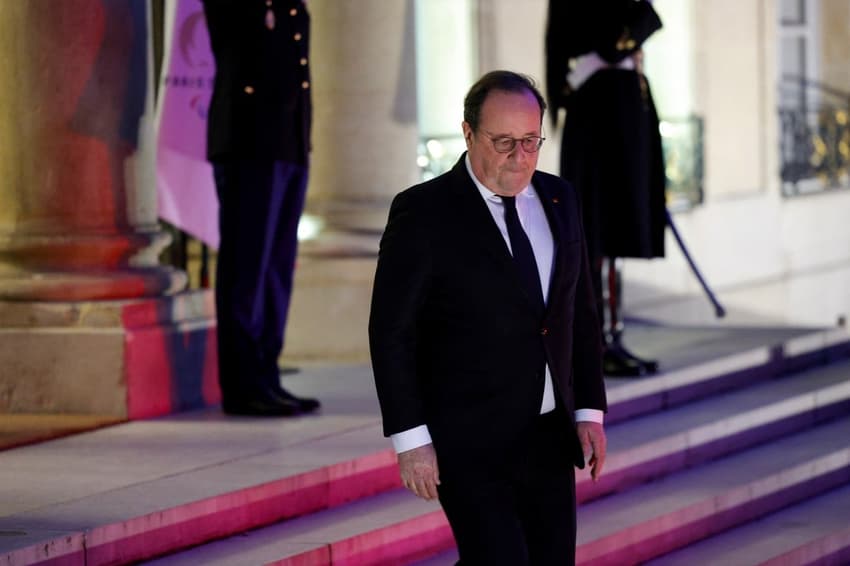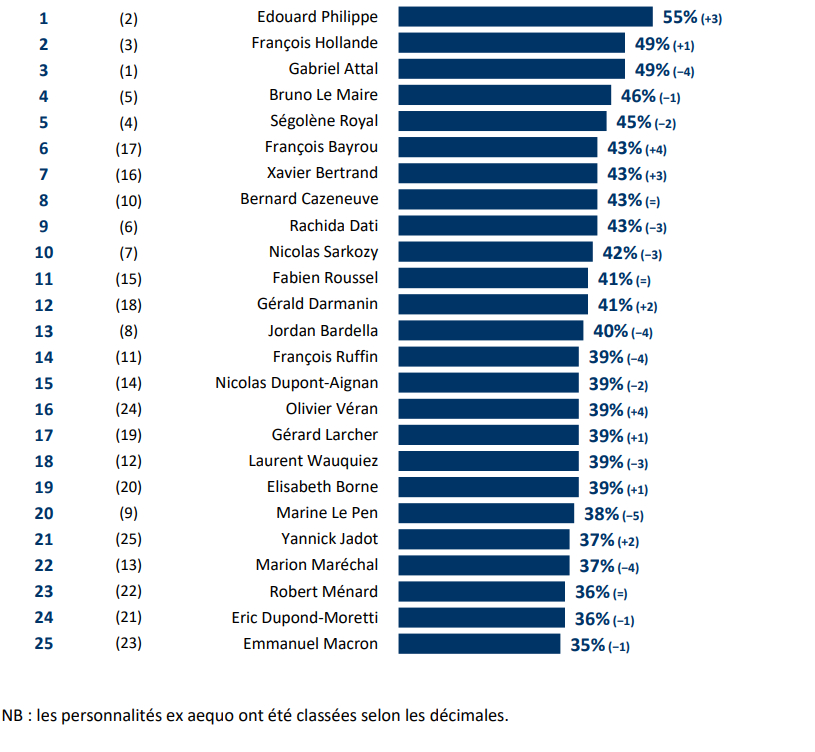OPINION: How to be loved by the French electorate? Retire or die

It is usually the case that the French hate their current leaders - writes John Lichfield - but why do those same leaders, despised during their term in office, become so beloved once they retire or die?
It will be 60 years this July that I made my first visit to Paris. Within minutes of stepping off the coach from Brussels with my Belgian Godmother, I had my first French political experience. One of the French men unloading our bags started an argument with one of the Belgian visitors from the bus.
The Belgian man began to praise Charles de Gaulle, who was then half-way through his ten-year career as the first President of the Fifth Republic. The French man said De Gaulle was a traitor, an autocrat and other things that a 14-years-old from North Staffs did not understand.
I was puzzled and vaguely shocked. At home, strangers might argue on the street about football or the weather or pop music - Beatles v Rolling Stones - but never about politics. In any case, I assumed that De Gaulle, the war-time hero, was universally loved by the French.
Four years later, Paris was convulsed by the May 1968 student-worker revolt.
Sixty years later, almost every French politician and party, from the hard left to the far right, claims to be partly “Gaullist”.
Sixty years later, it also remains the case that the most popular French leaders are the dead or the retired. Jacques Chirac, a genial but largely hopeless president convicted of corruption after leaving office, is now more popular in death than he ever was in life.
François Hollande broke all records for unpopularity when he was President from 2007-2012. At one point in 2016, his approval rating fell to 4 percent.
There was never any convincing reason why he was so unpopular. His spell in the Elysée Palace was troubled by amorous escapades and party-political revolts but he also made courageous decisions which, amplified by Emmanuel Macron, have ended two decades of mass unemployment.
Guess who is now the second most popular politician in France? The Paris-Match-IFOP monthly league table of political approval for March has just been published. François Hollande, who has been rising steadily for several months, is now in second place on 49 percent.

The Paris-Match-IFOP opinion poll on the 'good opinion' of various French politicians.
His Socialist party has all but collapsed as a national force since he decided not to run again in 2017. Total support for the Left and Greens hovers around 32 percent. Hollande is a frequent, cheerful guest on TV discussion programmes; he often puts the boot in his former protégé, President Macron. He appear to have built a new personal following which includes parts of the Centre and the Right.
There is even talk of Hollande weighing his chances of running again for the presidency in 2027. (Don’t do it, François, unless you miss being mocked and detested.)
He is not the only once-derided politician to have found an Indian summer of popularity in the Paris-Match-IFOP poll.
Ségolène Royal, the defeated Socialist presidential candidate in 2007, who made a fool of herself in 2022 by repeating Russian propaganda points about the Ukraine war, is now the fifth most popular French politician on 45 percent.
Former President Nicolas Sarkozy, twice convicted since leaving office for trying to bribe a judge and for breaching campaign spending limits, is in 10th place on 42 percent.
President Emmanuel Macron is in 25th place on 35 percent (and sinking).
The IFOP-Match monthly survey, although fascinating, is not a classic opinion poll. A representative sample of just over 1,000 people is asked by pollsters whether they have a generally good or bad opinion of a long list of politicians, active or inactive.
That is not the quite the same as asking people who they would vote for.
Some government figures do well. The Prime Minister, Gabriel Attal, is at 49 percent good opinions (third) but falling. The finance minister, Bruno Le Maire is in fourth place with 46 percent.
The monthly Paris Match league table is also an interesting corrective to speculation about the next Presidential election in 2027(when Macron cannot run again). Suggestions by other polls that the far-right leader Marine Le Pen is stealthily gaining ground are not confirmed by the Match-IFOP “good opinions” table.
In this month’s survey, Le Pen plunges nine places and five points to only the 20th most “liked” politician in France (on 38 percent). Her de facto Number Two, Jordan Bardella, falls eight places and four points to 40 percent.
Is this an early sign of weakening support for Le Pen because of her long history of Vladimir-Putin worship (temporarily suspended)? That’s not yet clear. There are often fluctuations in the poll.
OPINION: Which side would Le Pen be on in WWIII? French history gives a clue
But one finding has been rock-steady for many months. The French politician with the most “good opinions” is Macron’s former Prime Minister, Edouard Philippe. He was briefly dethroned by Attal last month but he tops the pile again in March with 55 percent good or very good opinions.
Philippe is the favourite to lead the centrist camp in the 2027 elections. Talk of a Le Pen victory, although not to be excluded completely, is premature.
I digress. The unpopularity of those in power and the popularity of their would-be successors is a fact of life in most democratic countries. What makes France unusual is its exaggerated hatred of its current leaders and its adoration of its dead or retired ones.
No doubt even Emmanuel Macron will be loved in 2040.
How to explain this French peculiarity? I am not sure I can. France is a querulous, impatient country which often fails to recognise its own blessings. But why does it like to love those that it once detested?
Comments (1)
See Also
It will be 60 years this July that I made my first visit to Paris. Within minutes of stepping off the coach from Brussels with my Belgian Godmother, I had my first French political experience. One of the French men unloading our bags started an argument with one of the Belgian visitors from the bus.
The Belgian man began to praise Charles de Gaulle, who was then half-way through his ten-year career as the first President of the Fifth Republic. The French man said De Gaulle was a traitor, an autocrat and other things that a 14-years-old from North Staffs did not understand.
I was puzzled and vaguely shocked. At home, strangers might argue on the street about football or the weather or pop music - Beatles v Rolling Stones - but never about politics. In any case, I assumed that De Gaulle, the war-time hero, was universally loved by the French.
Four years later, Paris was convulsed by the May 1968 student-worker revolt.
Sixty years later, almost every French politician and party, from the hard left to the far right, claims to be partly “Gaullist”.
Sixty years later, it also remains the case that the most popular French leaders are the dead or the retired. Jacques Chirac, a genial but largely hopeless president convicted of corruption after leaving office, is now more popular in death than he ever was in life.
François Hollande broke all records for unpopularity when he was President from 2007-2012. At one point in 2016, his approval rating fell to 4 percent.
There was never any convincing reason why he was so unpopular. His spell in the Elysée Palace was troubled by amorous escapades and party-political revolts but he also made courageous decisions which, amplified by Emmanuel Macron, have ended two decades of mass unemployment.
Guess who is now the second most popular politician in France? The Paris-Match-IFOP monthly league table of political approval for March has just been published. François Hollande, who has been rising steadily for several months, is now in second place on 49 percent.

His Socialist party has all but collapsed as a national force since he decided not to run again in 2017. Total support for the Left and Greens hovers around 32 percent. Hollande is a frequent, cheerful guest on TV discussion programmes; he often puts the boot in his former protégé, President Macron. He appear to have built a new personal following which includes parts of the Centre and the Right.
There is even talk of Hollande weighing his chances of running again for the presidency in 2027. (Don’t do it, François, unless you miss being mocked and detested.)
He is not the only once-derided politician to have found an Indian summer of popularity in the Paris-Match-IFOP poll.
Ségolène Royal, the defeated Socialist presidential candidate in 2007, who made a fool of herself in 2022 by repeating Russian propaganda points about the Ukraine war, is now the fifth most popular French politician on 45 percent.
Former President Nicolas Sarkozy, twice convicted since leaving office for trying to bribe a judge and for breaching campaign spending limits, is in 10th place on 42 percent.
President Emmanuel Macron is in 25th place on 35 percent (and sinking).
The IFOP-Match monthly survey, although fascinating, is not a classic opinion poll. A representative sample of just over 1,000 people is asked by pollsters whether they have a generally good or bad opinion of a long list of politicians, active or inactive.
That is not the quite the same as asking people who they would vote for.
Some government figures do well. The Prime Minister, Gabriel Attal, is at 49 percent good opinions (third) but falling. The finance minister, Bruno Le Maire is in fourth place with 46 percent.
The monthly Paris Match league table is also an interesting corrective to speculation about the next Presidential election in 2027(when Macron cannot run again). Suggestions by other polls that the far-right leader Marine Le Pen is stealthily gaining ground are not confirmed by the Match-IFOP “good opinions” table.
In this month’s survey, Le Pen plunges nine places and five points to only the 20th most “liked” politician in France (on 38 percent). Her de facto Number Two, Jordan Bardella, falls eight places and four points to 40 percent.
Is this an early sign of weakening support for Le Pen because of her long history of Vladimir-Putin worship (temporarily suspended)? That’s not yet clear. There are often fluctuations in the poll.
OPINION: Which side would Le Pen be on in WWIII? French history gives a clue
But one finding has been rock-steady for many months. The French politician with the most “good opinions” is Macron’s former Prime Minister, Edouard Philippe. He was briefly dethroned by Attal last month but he tops the pile again in March with 55 percent good or very good opinions.
Philippe is the favourite to lead the centrist camp in the 2027 elections. Talk of a Le Pen victory, although not to be excluded completely, is premature.
I digress. The unpopularity of those in power and the popularity of their would-be successors is a fact of life in most democratic countries. What makes France unusual is its exaggerated hatred of its current leaders and its adoration of its dead or retired ones.
No doubt even Emmanuel Macron will be loved in 2040.
How to explain this French peculiarity? I am not sure I can. France is a querulous, impatient country which often fails to recognise its own blessings. But why does it like to love those that it once detested?
Join the conversation in our comments section below. Share your own views and experience and if you have a question or suggestion for our journalists then email us at [email protected].
Please keep comments civil, constructive and on topic – and make sure to read our terms of use before getting involved.
Please log in here to leave a comment.